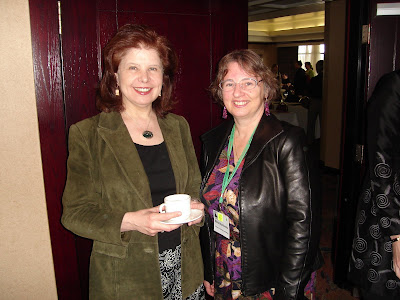
As a part-time writer and scientist, and a mother, I have to balance my life with my art as well as the business side of my writing with its muse-side. A large part of that consists of attending conferences and conventions on writing, science and science fiction. But I can only afford to attend a few each year. Nancy Kress was the reason I went to “Write On, Vancouver” held by the Vancouver Chapter of the Romance Writers of America. She’s the author of 23 books (11 of them science fiction, including her ‘sleepless’ trilogy beginning with “Beggars in Spain”).
Nancy Kress is an elegant, warm-hearted lady who quietly radiates class and great presence. In several workshops, Nancy tirelessly and cheerfully tackled some of the most difficult and daunting elements faced by published and unpublished writers alike. Topics included: writing Page One; plotting strategies; and what makes us write in the first place.
Quoting Proust to Falkner, Nancy enthralled a crowd of writers and readers with a presentation that educated, illuminated, and inspired. “All of us are tightrope walkers,” she said. Writers strive to balance art with life and personal taste with societal tastes. "Fiction is about stuff that gets screwed up...every novel is a war," she added and, quoting Susan Sontag, suggested that sometimes, “real art makes us nervous.”
Here are some of her tips on Writing Page 1:
>Introduce an individual character (usually the main protagonist) DOING something
>Orient us in time and space
>Use concrete details to help visualize the scene (including smells!)
>Create an interesting first line (hook).
Nancy shared four approaches to plotting. The one that was most familiar to me and worked best for my current novel was based on the ‘Hero’s Journey’, using mythical archetypes and adapted for writers by Christopher Vogler. Here are the nine steps:
1. Ordinary World
2. Call to adventure
3. Crossing the threshold (into the special world of the story: “a fish out of water”)
4. Tests, allies, rivals, and enemies
5. Approach to first climax (of 2)
6. First climax
7. The road back
8. Second big conflict (climax)
9. Denouement
I came away from the conference all jazzed and vindicated in my choice. Thanks, Nancy!
If you’re interested in more details, pick up Vogler’s book or just google “hero’s journey” and you’ll find lots of good information. You can also find my own example of a “Hero’s Journey” as applied to “Farscape” in the Scapecast podcast (March 16,07; episode 25, http://www.scapecast.org/) and in a later post on this blog.
I also cover this popular plot approach in my upcoming writing guide The Fiction Writer: Get Published, Write Now! (Starfire World Syndicate) to be released in 2009 and available at Amazon, Barnes & Noble and Chapters. It also forms part of my lecture series and online writing classes and workshops called "The Writer's Toolkit" that I give throughout North America and Europe. The workshop series will be available in a DVD set in summer of 2010 and you can purchase it through Amazon or The Passionate Writer.
Hi, Nina! thanks for visiting my blog & letting me know about yours!
ReplyDeleteI shall treasure Nancy's information, Nina - it's helped me structure the story/novel I'm working on. Thanks for sharing.
ReplyDelete